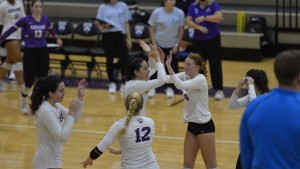Rowan Goldin ’25, a vice president of the Kenyon group and a member of the men’s lacrosse team, said he appreciates the organization’s focus on creating community and understanding.
“It's really important to just open this dialogue amongst everyone because you really don't know what people are going through,” Goldin said. “One day someone could seem the happiest ever, and the next day they're gone. So just opening up that dialogue for everyone to make sure that they know they have resources here.”
To raise awareness, each sport has one game that is dedicated to Morgan’s Message and mental health awareness. Football, field hockey, volleyball and men’s and women’s soccer already have held such games.
Morgan's Message members will hold meetings throughout the semester that are open to all, as well as watch parties of national events where speakers will talk about mental health topics.
“The best part about these watch parties also is that they're not always related to sports topics, so anyone can come watch it and find these resources valuable, which we think is important,” said Goldin. “It's for everyone.”
Part of the goal is to connect students with the resources that already are available to all members of campus.
“There are so many resources here at Kenyon that students in general just don't know about,” said Casey O’Neill ’24, a women’s lacrosse player and a vice president of the organization. “Getting to different groups would be huge.”
The repository of most resources is Cox Health and Counseling Center. Students can receive on-campus counseling by reaching out to counseling services via email (counseling@kenyon.edu) or phone (740-427-5525).
Another option for students seeking help 24/7 comes from TELUS Health Student Support, which can be accessed online or by an app. Students also are welcome to call the Campus Safety emergency line (740-427-5555) to be connected to a licensed mental health clinician.
“The app is a great tool as it provides the ability to connect with counselors via phone or chat,” Associate Director of Counseling Holly Baker said. “There are also screenings and other mental health and wellness related resources that can be accessed through the app.”
In athletics, many staff members have mental health first aid training, and there are procedures in place if a student-athlete is in distress, according to Director of Athletics, Fitness and Recreation Jill McCartney.
“While our coaches and staff are not mental health professionals, we know they are important resources themselves in promoting overall well-being and helping student-athletes understand and care for their mental health,” she said.
Support for Morgan’s Message has been strong so far. Already, Kenyon has 28 student “ambassadors” — liaisons between the national organization and local chapter — nearly one for each sport.
McCartney said Kenyon is fortunate to have Morgan’s Message — and its student-led mission — on campus.
“It's really impressive how much student-athletes have taken ownership of the message that mental health is important and that, as they say, not being OK is OK.”

